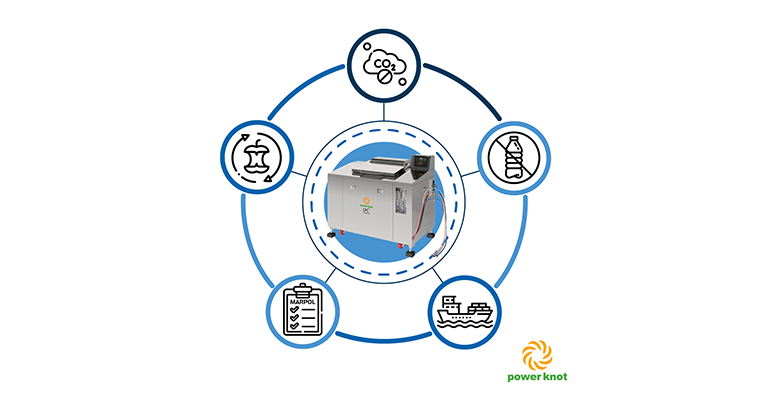Why is food waste an issue?
Every commercial kitchen generates food waste, whether it is from preparation or operations. When food waste is created at sea, it must be stored onboard and properly disposed of. If untreated food waste is released into the ocean, it causes highly detrimental effects on the environment. It can cause algae bloom, disrupt the natural food chain, and many other issues.
How does food waste dovetail with global warming?
There is a large carbon footprint associated with dumping food waste in the ocean or to a landfill. For example, there is about 1 kg of CO2e associated with the production and delivery of 1 kg of vegetables to a restaurant but four times that if that same waste is dumped in the ocean or discarded in a landfill. In the United States, we waste around 30-40% of the food that is produced.
What is Power Knot and the LFC biodigester?
Power Knot developed the LFC biodigester in response to customer demand to make a significant impact on its carbon footprint. Power Knot designs and manufactures the LFC® biodigester in Silicon Valley, California.
The LFC biodigester is a fully enclosed automatic food waste digester that disposes of most food waste within 24 hours. It uses a natural process called aerobic digestion in which microorganisms eat the food waste and turn it into water. There are eight different sizes that digest from 10 kg (20 lb) per day to 3000 kg (6600 lb) per day of organic waste.
How does Power Knot envision the LFC biodigester changing the face of waste management at sea?
Traditional waste management is expensive and time consuming. No one likes to talk about it because the truth is that what happens to the waste is not environmentally friendly.
Most waste ships utilize a food pulper which grinds down food into particles that are sometimes dehydrated and later incinerated. This process requires natural resources and is expensive and detrimental to the environment. In other cases, those particles are just dumped in the ocean. To prevent plastics getting to the ocean, the use of a food pulper usually requires oversight from an Environmental Officer.
The LFC biodigester is inherently designed to prevent non-organic waste from entering the waste stream. No oversight is required for this automatic process. Food waste does not need to be incinerated. Once it enters the machine, it is digested and converted into water typically within the same day. A drop in replacement system for pulpers has made biodigesters a popular choice.
Why should we care about waste data analytics?
You can’t control what you can’t measure. All LFC biodigesters have a color touch screen which shows the amount of waste ingested and when it was ingested by the hour, day, week, month or year. Machines with the NFC card reader can also show the type of waste ingested, too.
The LFC biodigesters automatically connect to the LFC Cloud, Power Knot’s revolutionary continuous data analytics system. Through the LFC Cloud, customers can see all this data remotely so fleet managers can understand where improvements can be made. This can result in wasting less and improving profitability. It is simple to create ESG reports and monitor operations for regulatory compliance.
Who is currently using the LFC biodigester?
All major cruise lines currently use the LFC biodigester. We have machines installed on six continents and many of the world’s oceans. Other customers include cargo ships, FSRUs, tankers, and mega yachts.
For more information, access www.powerknotocean.com or email [email protected].

